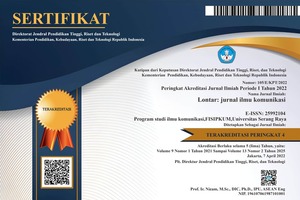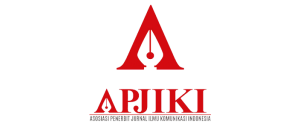Pergeseran Isu dalam Wacana Desa Tangguh Bencana (DESTANA) Pandemi Covid-19: Kasus Yogyakarta dan Surabaya
DOI:
https://doi.org/10.30656/lontar.v9i2.3976Keywords:
Destana, Discourse, Covid-19 Pandemic, Desa, KampungAbstract
This article aims to describe complexity of news texts on discourse Desa Tangguh Bencana (Destana) in Yogyakarta and Surabaya which are contained in online media throughout the process of handling the Covid-19 pandemic in 2020. This article use the critical discourse analysis (CDA) from Teun A van Dijk’s model (1988) to analyze the structure of news report which consists of two main categories: summary and story. The summary aspect is reduced to an analysis of headlines and leads. The story is revealed to analysis of the situation and comments. The result of analysis found that had been a shift in Destana discourse in 2 (two) online media (merdeka.com, and medcom.id3). The discourse shitfting comes from an informative discourse to an investigative discourse during May – November 2020. Another finding was that there was a pattern of the use of issues and discourses that remain the same as a 'stage' for the appearance of the political elite. They have been using Destana's humanist discourse to become politically charged with the shift in the word 'Desa' into 'Kampung'.
References
Abdillah, A. (2007). Budaya Arek Suroboyo. Tesis, tidak diterbitkan. Surabaya: Pasca Sarjana Universitas Airlangga Surabaya.
Azhari, M. A. (2021). Dukungan Sosial bagi Penderita Disfungsional untuk Penguatan Kesehatan Mental: Studi Syarah Hadis dengan Pendekatan Psikologi Islam. Jurnal Riset Agama, 1(2), 308–322.
Barasa, M. N., Khasanda, V. I., & Nyandoro, G. O. (2020). A Discursive Analysis of the Interactive Meaning in Covid-19 Containment Discourses in Social Media: Perspectives on Family Relationships. Journals and Research Papers: School of Arts and Social Sciences.
Carvajal-Miranda, C., Mañas-Viniegra, L., & Liang, L. (2020). Online Discourse in the Context of COVID-19, the First Health Crisis in China after the Advent of Mobile Social Media: A Content Analysis of China’s Weibo and Baidu. Social Sciences, 9(10), 167. https://doi.org/10.3390/socsci9100167
Chen, E., Lerman, K., & Ferrara, E. (2020). Tracking social media discourse about the covid-19 pandemic: Development of a public coronavirus twitter data set. JMIR Public Health and Surveillance, 6(2), e19273. https://doi.org/10.2196/19273
Cottam, M. L., Dietz-Uhler, B., Mastors, E., & Preston, T. (2012). Pengantar Psikologi Politik (2nd ed.; E. Tjo, Ed.). Jakarta: PT RajaGrafindo.
Fang, F. (2020). Wuhan Diary: Awal Kisah Pandemi yang Melumpuhkan Dunia (R. Indardini, Ed.). Yogyakarta: PT. Bentang Pustaka.
Hardiman, F. B. (2009). Demokrasi Deliberatif: Menimbang Negara Hukum dan Ruang Publik dalam teori Diskursus Habermas. Yogyakarta: Kanisius.
Hardiman, F. B. (2010). Ruang Publik: Melacak “Partisipasi Demokratis†dari Polis sampai Cyberspace. Yogyakarta: Kanisius.
Hardiman, F. B. (2021). Aku Klik maka Aku Ada: Manusia dalam Revolusi Digital. Yogyakarta: Kanisius.
Harsono, A. (2010). Agama Saya Adalah Jurnalisme. Yogyakarta: Penerbit Kanisius.
Samhadi, S. H., Aristiarini, A., & Krisnawan, Y. (2021). Cendekiawan dan Pandemi Covid-19: Kronik Opini Pilihan Kompas 1. Jakarta: PT Kompas Media Nusantara.
Santoso, A., & Soimin. (2016). Mataram dan Modernisme: Sejarah Politik Kolonialisme dan Memberadabkan Nusantara. Malang: Intrans Publishing.
Schenker, J. (2021). Masa Depan Dunia setelah Covid-19: Perubahan, Tantangan, dan Peluang di Berbagai Sektor Kehidupan Pasca-Pandemi (Y. Musthofa, Ed.). Tangerang: PT Pustaka Alvabet.
Senthilingam, M. (2021). Wabah dan Pandemi, Penerjemah (H. Andrayani, Ed.). Jakarta: Kepustakaan Populer Gramedia.
Sinaga, L. C., Suryani, D., Khanisa, Adaba, P. Y., Kristimanta, P. A., & Nasution, A. M. (2020). Penanganan Covid-19 dalam Perspektif Politik. Jakarta: Yayasan Pustaka Obor Indonesia.
Sulhan, M. (2020). Dramaturgi Politik Indonesia: Membaca Talkshow Politik Menyingkap Wajah Politisi. Malang: Intrans Publishing.
Sulhan, M., & Sadasri, L. M. (2021). Jagat Komunikasi Kontemporer: Ranah, Riset dan Realitas. Yogyakarta: Gadjah Mada Press.
Triana, R., Rahman, R., Rustandi, A., Efendi, D. R., & Hidayat, S. A.-A. (2021). Pemberdayaan Media Sosial Masyarakat Terhadap Peningkatan Pendidikan, Dakwah Islam, Dan Kesehatan Lingkungan Pada Era Pandemi Covid-19. Khidmatul Ummah: Jurnal Pengabdian Kepada Masyarakat, 2(01), 92–108.
Van Dijk, T. A. (1988). News as Discourse. New Jersey: Lawrence Erlbaum Associates, Inc. Publishers.
Downloads
Published
Issue
Section
License
By submitting an article to the journal, the author(s) agree to transfer the published article's copyright to the journal, which will act as the publisher. This means the journal will have the right to publish the article in various forms, including reprints. The journal will maintain the publishing rights to the published articles.
In line with the license, authors and third parties (readers, researchers, and others) are allowed to share and adapt the material. In addition, the material must be given appropriate credit, provided with a link to the license, and indicated if changes were made. If authors remix, transform, or build upon the material, authors must distribute their contributions under the same license as the original.






